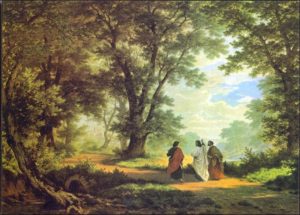When Mr. Tang joined our luncheon Bible study, he was met with welcoming smiles. Before our weekly sessions would draw to a close, Host Cathy would give opportunity for voicing prayer needs. A few weeks in, Mr. Tang politely raised his hand.
“I wish to have you pray, please. I have been smoking cigarettes for a long time and I have tried to stop the habit many times but with no success. Can you pray for this?”
“Certainly,” Cathy smiled.
A few weeks passed. Again, Mr. Tang’s raised hand.
“I just want to say that from the day of praying about my smoking problem, I have not wanted a cigarette and I have not smoked one since.” Once more smiles met him – this time in happy celebration.
The journey into faith takes as many routes as there are disciples trekking them. Each story unique.
For Mr. Tang – the thoughtful scholar who had competed with his daughter over a picture-story Bible – his narrative continued unfolding, step by gentle step.
“I’m glad you could come, Tang.”
The doctoral student was attentive as he sat with Ann and me, taking in our Sunday morning worship service. The preaching message highlighted God’s servant Joshua leading his people across the Jordan River into the Promised Land. At the close, Pastor Morgan extended an invitation,
“If anyone might be at a place where you sense you are ready to venture into new territory – a new place in your life in God, we welcome you to just come to the front area here for prayer. Jesus Christ will meet you today. God will lead you forward.”
Sensing Christ at work as Mr. Tang moved toward the aisle, I followed him forward. There in the Lord’s house, a quiet setting void of fanfare, I was privileged to lead my friend in a simple prayer as he offered himself to God. A formidable divide was breached.
When the service ended and we had made our way to the lobby, Mr. Tang slowed and turned my way.
“Jerry, when we were there at the front and praying, I felt something. It felt like. . .” He paused to find expression. I never forgot his words – fitting language for a science major, I afterward mused,
“It was like liquid electricity coming into my head and flowing down through my whole body”.
I sensed the sacredness in his tone. We lingered a moment in silence. There was nothing to add.
©2024 Jerry Lout



